

Security. Inside Washington's high risk mission to beat web censors. For more than a year, the intelligence services of various authoritarian regimes have shown an intense desire to know more about what goes on in an office building on L Street in Washington DC, six blocks away from the White House.
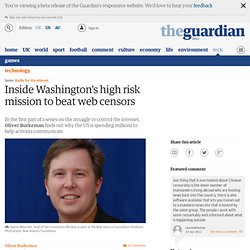
The office is the HQ of a US government-funded technology project aimed at undermining internet censorship in countries such as Iran and Syria. And so every week – sometimes every day – email inquiries arrive there that purport to be from pro-democracy activists in those places, but which, the recipients are confident, actually come from spies. This is international espionage at its most elementary: pretend to be a sympathiser, ask for more details, and just maybe, if you're lucky, some unsuspecting intern or temp will forward you the secret plans. China's censorship can never defeat the internet. Chairman Mao used to say: "As communists we gain control with the power of the gun and maintain control with the power of the pen.
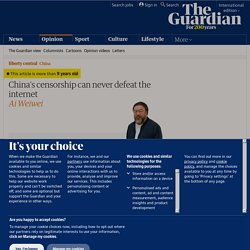
" You can see propaganda and the control of ideology as an authoritarian society's most important task. Before the internet, all people could do was watch TV or read the People's Daily. They would carefully read between the lines to see what had happened. Now it is very different. The papers try to talk about things, but even before they appear, everyone has talked about it on the internet. I still think Gorbachev's revolution in Russia – glasnost – was more important. Even though we had reform and opening, "opening" didn't mean "openness"; it meant opening the door to the west. But since we got the net and could write blogs – and now microblogs – people have started to share ideas, and a new sense of freedom has arisen. But the government cannot give up control. But censorship by itself doesn't work.
When I was young I became rebellious. Nervous Kremlin seeks to purge Russia's internet of 'western' influences. Web freedom faces greatest threat ever, warns Google's Sergey Brin. The principles of openness and universal access that underpinned the creation of the internet three decades ago are under greater threat than ever, according to Google co-founder Sergey Brin.
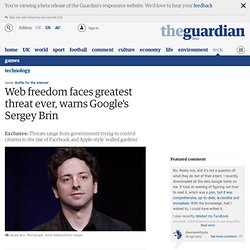
In an interview with the Guardian, Brin warned there were "very powerful forces that have lined up against the open internet on all sides and around the world". How tiny Estonia stepped out of USSR's shadow to become an internet titan. In 1995, four years after Estonia broke free from the USSR, Toomas Hendrik Ilves read a "very Luddite" book by Jeremy Rifkin called The End of Work.
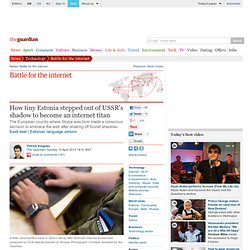
"It argued that with greater computerisation there would be fewer jobs," remembered Ilves, then a senior diplomat, now the country's president, "which from his point of view was terrible. " Ilves and many of his colleagues saw it differently. In a tiny (population: 1.4 million) and newly independent country like Estonia, politicians realised computers could help quickly compensate for both a minuscule workforce and a chronic lack of physical infrastructure. The Geopolitics of the iPhone - By Brian Fung. The business: Coltan -- short for columbite-tantalite -- is an ore that takes on heat-resistant properties when it gets refined.

China's censors tested by microbloggers who keep one step ahead of state media. In the opaque world of Chinese censorship, a few red lines shine through the murk.
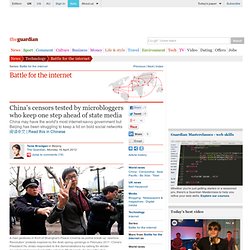
One of the clearest is: no gossip about top political leaders, their families or internal party affairs. But just as the authorities had vowed to tame China's rumbustious microblogs, they have seen an unprecedented wave of speculation and comment on the most sensitive subjects: political infighting, lurid allegations of murder and even (unfounded) claims of a coup. State attempts to control the web, including stern admonitions, large-scale deletions, real-name registration, website closures and even detentions have failed to rein in users. More intriguingly, some of the most startling rumours have proved at least partially true – leading some to wonder whether this is simply a battle between bold users and anxious censors, or something more complex.
Surviving the digital swarm. The Chinese Room - 60-Second Adventures in Thought (3/6) Future - Science & Environment - Touch-and-go tablet and computer screens. The new iPad launched yesterday amid its usual fanfare.
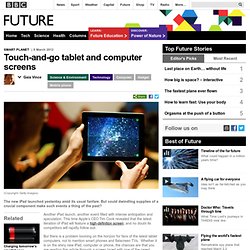
But could dwindling supplies of a crucial component make such events a thing of the past? Another iPad launch, another event filled with intense anticipation and speculation. This time Apple’s CEO Tim Cook revealed that the latest iteration of iPad will feature a high-definition screen, and no doubt its competitors will rapidly follow suit. But there is a problem looming on the horizon for fans of the latest tablet computers, not to mention smart phones and flatscreen TVs.
Whether it is on the shiny new iPad, computer or phone, the chances are that you are reading this article through a screen laced with one of the rarest metals on Earth: indium. Such a prospect might not seem as alarming as running out of essential commodities, such as food or water. Wonder metal.